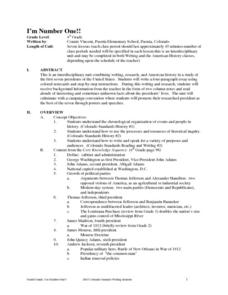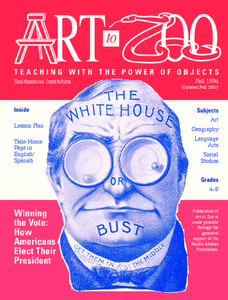Classroom Law Project
What are some of today’s voting issues? Voting in Oregon, youth vote, and technology
The youth vote. Rock the Vote. Vote-By-Mail. Electronic voting. Class members investigate issues facing today's voters, and the ways they have adapted over the years to optimize voter turnout.
PBS
What Are the Primaries and Caucuses?
What are the essential differences between primaries and caucuses? As part of a study of the process by which Americans select their candidates for US president, class members examine the nominating process, the changes that have...
Curated OER
Electoral College
Eleventh graders discover how the Electoral College works. In this presidential elections lesson, 11th graders compare and contrast the Electoral College and popular vote as they participate in a classroom simulation. Students also...
Curated OER
Electoral Politics
Students formulate their own opinions about the issues in an election campaign through a critical examination of political advertisements, candidate debates, and political cartoons.
Curated OER
Storytellers: Pearl Jam "Never Let Truth Get in the Way of a Good Story"
Students analyze the lyrics from a Pearl Jam song and examine the concept of truth in political advertising. They watch the video, "VH1 Storytellers: Pearl Jam," participate in a class discussion, conduct research, and prepare a report...
Curated OER
Cartoons for the Classroom: Primary Targets
For this current events worksheet, students analyze a political cartoon about primary elections and respond to 3 short answer questions.
Curated OER
It's an Ad Eats Ad World
Students explore the power and influence of television advertisements in presidential campaigns. They choose issues in the 2004 campaign and create promotional materials addressing these issues from varying points of view.
Curated OER
Cartoons for the Classroom: Epic Battle Rages On
In this current events worksheet, learners analyze political cartoons about the election of 2008 and respond to 3 talking point questions.
Curated OER
Cartoons for the Classroom: An Educated Electorate Takes its Mid-Term
For this current events worksheet, students analyze a political cartoon about mid-term elections in the United States and respond to 3 talking point questions.
Curated OER
I'm Number One!
Fourth graders complete a unit of lessons on the first seven presidents of the U.S. They conduct research, write a four-paragraph essay, and create posters and speeches for a simulated campaign convention.
Curated OER
TV ATTACK ADS AND THE VOTER
Learners read about the history of negative political advertisements in U.S. elections. In this politics lesson, students view several ads for opposing candidates and analyze and discuss the content. Learners write scripts for candidates...
Curated OER
Campaign 2004: Classroom Electorate
Young scholars role play as political analysts first forecasting the electoral college vote in a presidential election and then, following the results of the actual count. They study the role of swing states, and why political...
Curated OER
Why Vote? A Public Awareness Campaign
Students examine the structure of local government and determine why citizens vote. In this civics lesson, students listen to a lecture about the structure of local government and then encourage others to exercise their right to vote.
Classroom Jr.
Running for President Story Starter
Most American children have, at one point or another, imagined what it would be like to run for president. Offer this creative writing prompt to young writers and discover how the world would change if kids were charge.
Curated OER
Citizens of the Future
Young sociologists explore how local, state, and federal governments work. This very impressive and ambitious lesson requires pupils to contact government officials who represent them and their families. They research elections, and hold...
Curated OER
Campaigning Kids!
Students investigate state and national politics by holding a class election. In this government lesson, students utilize video and still cameras to record election races within their class. Students express their wishes for the...
Curated OER
Introducing Elections Unit
Students discover the political parties of our country by participating in a role playing activity. In this U.S. Government instructional activity, students visit several different classrooms that each represent one of the political...
Curated OER
Age of Jackson
Students work on political campaigns. In this campaign history instructional activity, students study the American presidential elections of 1824 and 1828. Students research primary and secondary sources to learn about the campaigns....
C-SPAN
Polling and Public Opinion
Most people are eager to offer their opinions about topics of interest, but what's the most effective way to collect and assess these opinions as a matter of fact? High schoolers learn about the history of polling, as well as the...
Curated OER
The White House or Bust: How Americans Elect Their President
Students explain the presidential duties and who is eligible to run for president. In this The White House or Bust article, students complete a map of the electoral college. In addition students analyze historical campaign posters....
Curated OER
Promoting the Candidate
Young scholars identify the role of political parties in presidential elections, then interpret objects from presidential campaigns.
Curated OER
Presidential Campaigning
Eighth graders participate in a simulated presidential campaign by conducting research on the Internet. They define a party platform, run a campaign and write and deliver speeches in teams. Students can then act as the electoral college...
Curated OER
Presidential Debate Primer
Students examine the function of presidential debates. In this civics lesson, students view segments of presidential and vice presidential debates. Students analyze the answers given in the debates and identify the platforms of the...
Curated OER
The Eleventh Hour
Students examine their own understanding of the issues and events that are framing this year's presidential race. They explore the candidates' stances on eight issues and present their findings to the class.

























